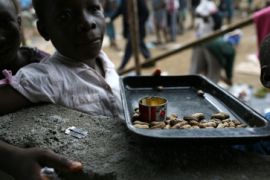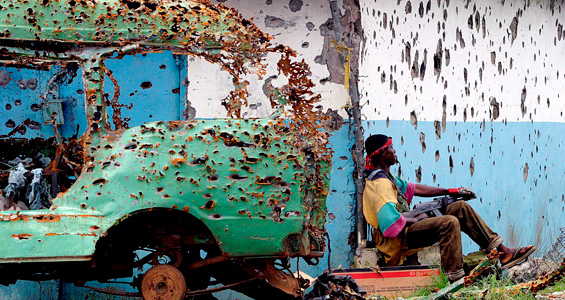Liberians look to US roots
Haru Mutasa on how Barack Obama is inspiring those in the poorest parts of Africa.

 |
| Liberia still bears the scars of internal conflict [EPA] |
It’s surreal arriving in Liberia’s capital Monrovia.
It was founded by free American black slaves back in the 1800s – slaves who chose to leave the United States and start again in Africa.
Those Black American ‘pioneers’ named their settlement Monrovia after the then US president James Monroe.
The colony became known as Liberia.
It’s a war-ravaged country with people trying to rebuild their lives after decades of bloody coups. Driving through Broad Street – said to be the busiest street in Monrovia – the carnage from the war is still visible.
What used to be bustling office blocks and apartment buildings are now just empty shells.
Everywhere I go people talk about how fierce gun battles between government forces and rebel groups were – especially when the battle reached the capital Monrovia.
Terrible poverty
Three years after the country held democratic elections – the reconstruction process is slow.
| In focus |
 In-depth coverage of the US presidential election |
Those made homeless by the war make themselves comfortable in abandoned buildings that litter the city.
People hand laundry out to dry.
Rebecca scrapes together a meal for her seven children.
“I can’t go home because it was destroyed during the war,” she moans, “I have no money to go back anyway. Living here is terrible – but it’s better than having nowhere. I have to make do with what I have.”
It is the poverty here that really hits you.
Everywhere you look you see it – families living in squalid conditions and people barely able to feed their children.
You can tell it used to be a beautiful place with its ’60s-style houses – but that was before the first coup in 1980.
With so much poverty, you would expect the US elections to be the last thing on peoples’ minds.
Obama-mania
You don’t see T-shirts and banners like in other African countries. But almost everyone here is talking about the election – and Barack Obama.
Patrick Carter works in the bar at a hotel by the beach.
“I want Obama to win,” he says gleefully, “He is African. Why would I support anyone else? He’s the man. Just him [Obama] running for office is enough – it means anything is possible. It’s good – here in Africa we need hope.”
And, in war-ravaged Liberia, hope seems to be all people have here – among the poor anyway.
Unemployment, especially among the youth, is high. Ethnic and class differences remain a threat to national peace and security.
But despite these challenges, Liberians seem optimistic things will get better.
On Benson Street seven teenage boys play football.
It’s a familiar sight in Africa – as they chase around a ball scrunched up from old plastic bags.
But some of the boys wobble across the field on one leg – and a pair of crutches. The war took away their limbs – but they push on.
It’s hard keeping up with their able-bodied peers, but you can see the determination in their faces as they push on with the game.
Behind them an apartment building is going up – a sign the country has begun building again.
All the Liberians I spoke to say they’re rooting for Obama. Some say they will even stay up all night watching the election process.
And even if their favourite doesn’t win – for a people still traumatised by decades of war – the historic US election, the first time an African American is running for president of the United States, shows them it is okay to dare to dream.